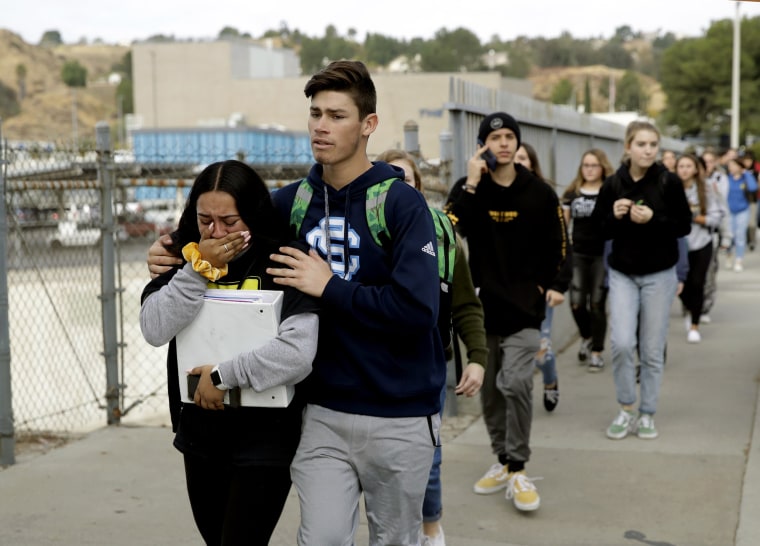The location, Saugus High School in Santa Clarita, California, is new. But we’ve been here many, many times before. We’ve heard the initial spotty reports of a mass shooting. Followed the developments as the victim toll climbs. Absorbed the heart-breaking stories of lives cut short and families devastated. Waited for police to identify the shooter, how that person obtained a gun and what warning signs were ignored.
As public opinion shifted toward demanding action on tobacco or air pollution, Congress acted, accepting the political perils of opposing powerful lobbying blocs.
And we’ve been here before as politicians mix platitudes with inaction, as they ignore obvious and seemingly apolitical policy recommendations and instead demonstrate fealty to the special interests of gun manufacturers and advocates as people continue to die from preventable massacres.
But we’ve also been here before: a place of collective outrage that turns the tide, where the toll to public health from some long-accepted practice is so appalling that even the most weak-willed among our congressional leaders (see: Senate Majority Leader Mitch McConnell) push forward legislation to keep special interests from killing more Americans.
The country today feels close to the mood of the mid-20th century when attitudes and then regulations transformed the landscape to restrain tobacco companies and polluting factories. Now change will come again, this time to the National Rifle Association and similar forces that have impeded common-sense approaches to ending our debilitating epidemic of gun violence.
We can hurry that change along by applying the strategies that worked several decades ago to usher in some of the greatest bipartisan triumphs over political stasis, malfeasance and special interest lobbying from the likes of Big Tobacco and the fossil fuel industry: using health-based arguments.
Tobacco-related lobbying in the 1950s and ’60s was similar to activities currently employed by the NRA — a highly political machine that spent extravagantly on political campaigns to influence voting records in spite of evidence that their efforts were harming the American public.
Even as evidence mounted that tobacco was linked to heart disease and lung cancer, Big Tobacco questioned the scientific validity of these studies, deliberately raising uncertainty in consumers’ minds. All the while, the lobbying behemoth was iconic across American life, sponsoring everything from game shows to cartoons to ads with doctors and celebrities on posters. These efforts paid handsome dividends, as more than 40 percent of Americans smoked in 1965.
All of these actions are evocative of the NRA’s behavior: intimidating Congress to pass the notorious Dickey Amendment in the 1990s, which limited federal funding for research on gun violence; deliberately undermining any research that does exist as a threat to the Second Amendment; and propagating a distorted reality that equates ownership of powerful, semi-automatic weapons of war to an affirmation of masculinity.
Yet political cowardice ultimately yielded to growing public outrage that cigarettes were killing people; to be an elected leader silent on this issue was to be complicit in the deaths of fellow Americans. The Surgeon General Report of 1964, which officially recognized the deleterious health effects of tobacco for the first time, started a chain reaction that has included adoption of cigarette-pack warning labels, bans on industry advertisements and, more recently, prohibitions on smoking in public places.
In effect, it gave political cover under the umbrella of health to leaders who previously lacked the courage to stand up to Big Tobacco. These efforts worked. As of 2017, rates of smoking had declined to less than 15 percent nationwide.
A similar sequence occurred when post-war America wrestled with the dramatic rise of air pollution-related deaths and illnesses in the late 1940s. Entire communities were inundated with smog from local factories; an epidemic in Donora, Pennsylvania, was especially eye-opening when thousands were sickened and 20 died. A few years later, the foundations of the modern Clean Air Act were passed.
But powerful fossil fuel and automobile lobbies blossomed throughout the Reagan years, and it wasn’t until 1990 that decisive action was taken after acid rain caused growing public distress. We can credit Reagan's Republican successor, George H.W. Bush, with addressing the crisis through the amendments to the Clean Air Act he signed, staving off an estimated 2.4 million cases of worsening asthma control, 135,000 hospital admissions and more than 230,000 premature deaths, according to the Environmental Protection Agency.
In these watershed cases, there was a clear legislative objective: reducing exposure to a risk factor that could kill. Also instructive is that as public opinion shifted toward demanding action on tobacco or air pollution, Congress acted, accepting the political perils of opposing powerful lobbying blocs in the process. This should give us hope.
Many of our peer countries are leaders in approaching and legislating gun violence as a public health problem, and we should have the humility to learn from them. Giffords (a U.S.-based gun-control think tank), in partnership with the National Physicians Alliance, has outlined several recommendations that cut to the core of public safety and reduce risk exposure. These include a greater focus on gun safety and training, which has been shown to reduce firearm-related injuries, and risk reduction through the strategic use of “red-flag” laws.
Ultimately, our history of overcoming politically controversial issues that result in people dying should be instructive to members of Congress concerned about their re-election prospects. Facing down the NRA and demonstrating political courage to protect public health and safety will be rewarded; cowardice will not.



